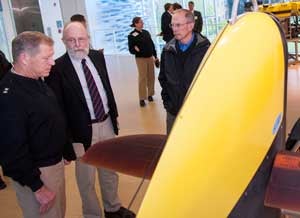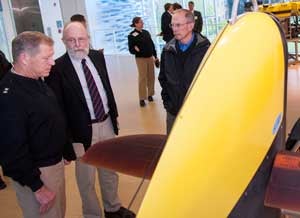 NARRAGANSETT, R.I. – June 11, 2014 — When U.S. Navy Rear Admiral Jonathan W. White visited the University of Rhode Island’s Graduate School of Oceanography last month, he received a series of briefings on oceanographic research and toured facilities to introduce him to projects conducted by URI oceanographers and ocean engineers that are of interest to the Navy and its national defense and security objectives.
NARRAGANSETT, R.I. – June 11, 2014 — When U.S. Navy Rear Admiral Jonathan W. White visited the University of Rhode Island’s Graduate School of Oceanography last month, he received a series of briefings on oceanographic research and toured facilities to introduce him to projects conducted by URI oceanographers and ocean engineers that are of interest to the Navy and its national defense and security objectives.
According to GSO Dean Bruce Corliss, it was an introductory meeting for the Navy’s top oceanographer and navigator, and it identified opportunities for possible future collaborations.
“It was an excellent exchange of information that we both learned a great deal from,” said Corliss. “The Admiral discussed oceanographic issues of importance to the Navy and the United States, and we outlined some of our research and the capabilities we have here at the Bay Campus, along with our education and outreach programs.”
The Navy is increasingly interested in issues related to climate change and their potential impact on national defense and security efforts, especially sea level rise and storm surges. Bases located near sea level could be subject to flooding, seriously affecting their support infrastructure and readiness. It’s a subject that several URI oceanographers are studying, including Assistant Professor Brice Loose, who described to the Admiral his studies of sea level rise and the melting of Antarctic glaciers.
Admiral White was also briefed on research related to underwater acoustics by Ocean Engineering Professor Jim Miller, who has received research funding from the Office of Naval Research for more than 20 years to support data collection and analysis to better inform decision makers on matters related to ship and submarine operations. He heard from Marine Scientist Dwight Coleman, GSO’s Inner Space Center director, about next year’s plans for E/V Nautilus’ exploration of the deep sea in the Eastern Pacific, a region of particular interest to the Navy and the United States. Coleman also addressed the unique telepresence capabilities installed on the ship and which are also being installed on the R/V Endeavor. Telepresence is used by the Inner Space Center to link global sea-based research with land-based scientists, researchers, and students.
Additionally, Gail Scowcroft, associate director of the Inner Space Center, provided a summary of GSO’s education and outreach programs and the positive impact they have made globally to promote the ocean sciences. “We have reached in excess of 60 million people over the last 12 years,” she said.
“I was really impressed by the professionalism and expertise of the GSO staff, and the quality of research and education programs they manage,” said Rear Admiral White. “The Inner Space Center has revolutionized traditional ocean research and has significantly expanded our knowledge of the maritime domain across many areas of national interest and in support of many Navy programs. For the Navy, the long relationship with the GSO and the University of Rhode Island has been very beneficial and we look forward to continuing that partnership.”
The Graduate School of Oceanography and Department of Ocean Engineering have long had ties to the Navy, with many scientists receiving Navy funding for their research. That relationship extends to academics as well. The Navy screens select Naval Academy graduates to enroll at URI. Recent graduate students include Ensign Kelly Knorr, who earned a master’s degree in oceanography last year, and Lieutenant Paulstephen Chierico, who will graduate with a master’s degree in ocean engineering in 2015. Additional students are slated to start during the fall 2015 semester, and enrollment from the Navy is expected to continue and expand in coming years.
“We’re getting excellent students from Annapolis to apply,” said GSO Associate Dean David Smith, who administers the program. “Although a very difficult program, they all successfully overcome the challenges associated with having to complete their degree within two years because that’s when their next Navy assignment begins. It’s a great program, and a great relationship that benefits faculty, students and the Navy.”
The University’s Blue MBA program, which combines a master’s degree in oceanography with a master’s in business administration, is another academic program in which the Navy has expressed interest. Retired Rear Admiral Richard West, a former U.S. Navy oceanographer and navigator who serves on the GSO Board of Advisors, has recommended that Navy officers seeking to reach the upper levels of the service consider enrolling in this unique program.
Dean Corliss is also reaching out to other arms of the Navy to build expanded relationships. In addition to meeting with the Naval Undersea Warfare Center in Newport, he met last month with John Garofano, the dean of Academic Affairs at the Naval War College in Newport, to open communication and pursue possible collaborations, including potentially re-establishing the annual GSO oceanography lecture that had been a fixture at the War College for many years.
“Because of our similar interests in the marine environment, there is a natural affinity between the Graduate School of Oceanography and the maritime services, including the U.S. Navy, and we both benefit from closer ties and the establishment of new partnerships,” said Corliss. “These recent meetings are an important step in that direction.”
Pictured above: During a tour of the URI Graduate School of Oceanography, U.S. Navy Rear Admiral Jonathan White (left) learns about technology used in ocean exploration from GSO Dean Bruce Corliss. Looking on at right is retired Navy Rear Admiral Richard West. (Photo by Mike Salerno Photography)

